Winston Churchill: Leadership, Command, and Management Analysis
VerifiedAdded on 2022/11/24
|14
|4148
|412
Essay
AI Summary
This assignment delves into the life and leadership of Winston Churchill, a prominent political figure of the 20th century. It examines his abilities in command, leadership, and management, highlighting the interrelation of these concepts. The essay provides an overview of Churchill's life and career, then explores his commanding ability, leadership qualities, and management skills. The assignment also focuses on the relationship between these three aspects and their significance in achieving organizational goals. It contrasts the military and corporate perspectives on command, leadership, and management. The essay underscores Churchill's strategic vision, his ability to inspire and motivate, and his effective use of communication during World War II. The essay emphasizes the importance of attitude, strategic planning, and effective command in achieving success, drawing lessons from Churchill's leadership during a critical period in history.
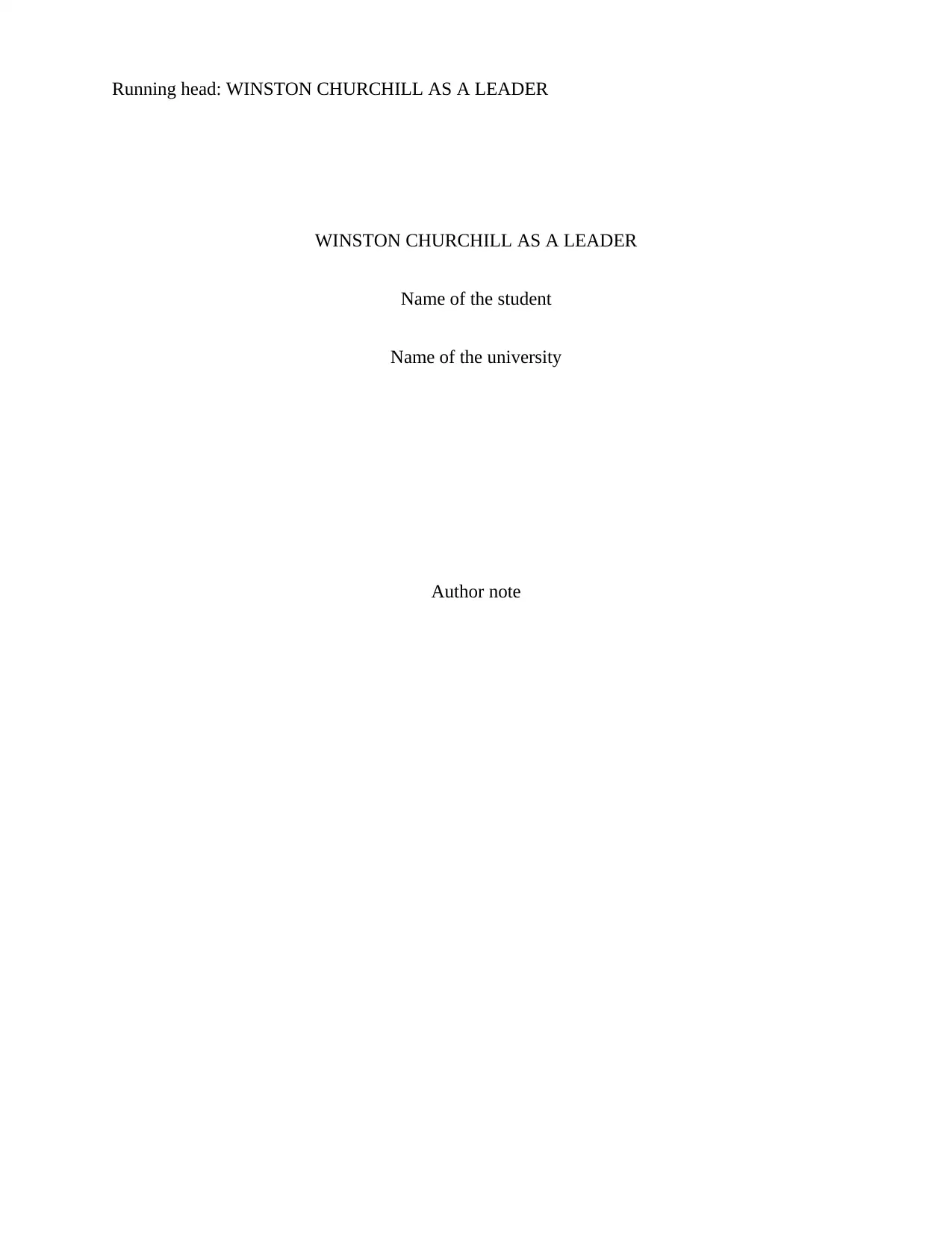
Running head: WINSTON CHURCHILL AS A LEADER
WINSTON CHURCHILL AS A LEADER
Name of the student
Name of the university
Author note
WINSTON CHURCHILL AS A LEADER
Name of the student
Name of the university
Author note
Paraphrase This Document
Need a fresh take? Get an instant paraphrase of this document with our AI Paraphraser
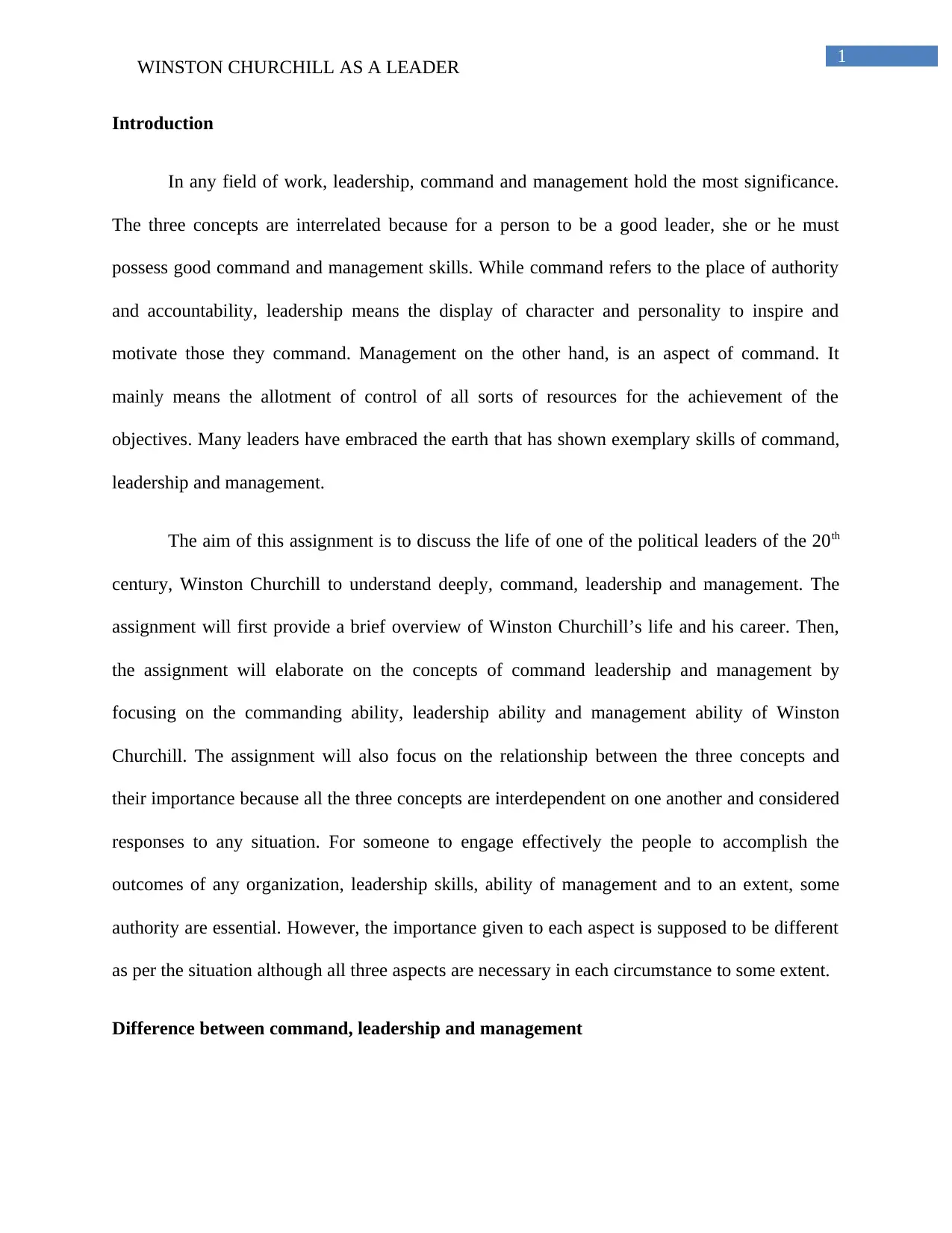
1
WINSTON CHURCHILL AS A LEADER
Introduction
In any field of work, leadership, command and management hold the most significance.
The three concepts are interrelated because for a person to be a good leader, she or he must
possess good command and management skills. While command refers to the place of authority
and accountability, leadership means the display of character and personality to inspire and
motivate those they command. Management on the other hand, is an aspect of command. It
mainly means the allotment of control of all sorts of resources for the achievement of the
objectives. Many leaders have embraced the earth that has shown exemplary skills of command,
leadership and management.
The aim of this assignment is to discuss the life of one of the political leaders of the 20th
century, Winston Churchill to understand deeply, command, leadership and management. The
assignment will first provide a brief overview of Winston Churchill’s life and his career. Then,
the assignment will elaborate on the concepts of command leadership and management by
focusing on the commanding ability, leadership ability and management ability of Winston
Churchill. The assignment will also focus on the relationship between the three concepts and
their importance because all the three concepts are interdependent on one another and considered
responses to any situation. For someone to engage effectively the people to accomplish the
outcomes of any organization, leadership skills, ability of management and to an extent, some
authority are essential. However, the importance given to each aspect is supposed to be different
as per the situation although all three aspects are necessary in each circumstance to some extent.
Difference between command, leadership and management
WINSTON CHURCHILL AS A LEADER
Introduction
In any field of work, leadership, command and management hold the most significance.
The three concepts are interrelated because for a person to be a good leader, she or he must
possess good command and management skills. While command refers to the place of authority
and accountability, leadership means the display of character and personality to inspire and
motivate those they command. Management on the other hand, is an aspect of command. It
mainly means the allotment of control of all sorts of resources for the achievement of the
objectives. Many leaders have embraced the earth that has shown exemplary skills of command,
leadership and management.
The aim of this assignment is to discuss the life of one of the political leaders of the 20th
century, Winston Churchill to understand deeply, command, leadership and management. The
assignment will first provide a brief overview of Winston Churchill’s life and his career. Then,
the assignment will elaborate on the concepts of command leadership and management by
focusing on the commanding ability, leadership ability and management ability of Winston
Churchill. The assignment will also focus on the relationship between the three concepts and
their importance because all the three concepts are interdependent on one another and considered
responses to any situation. For someone to engage effectively the people to accomplish the
outcomes of any organization, leadership skills, ability of management and to an extent, some
authority are essential. However, the importance given to each aspect is supposed to be different
as per the situation although all three aspects are necessary in each circumstance to some extent.
Difference between command, leadership and management
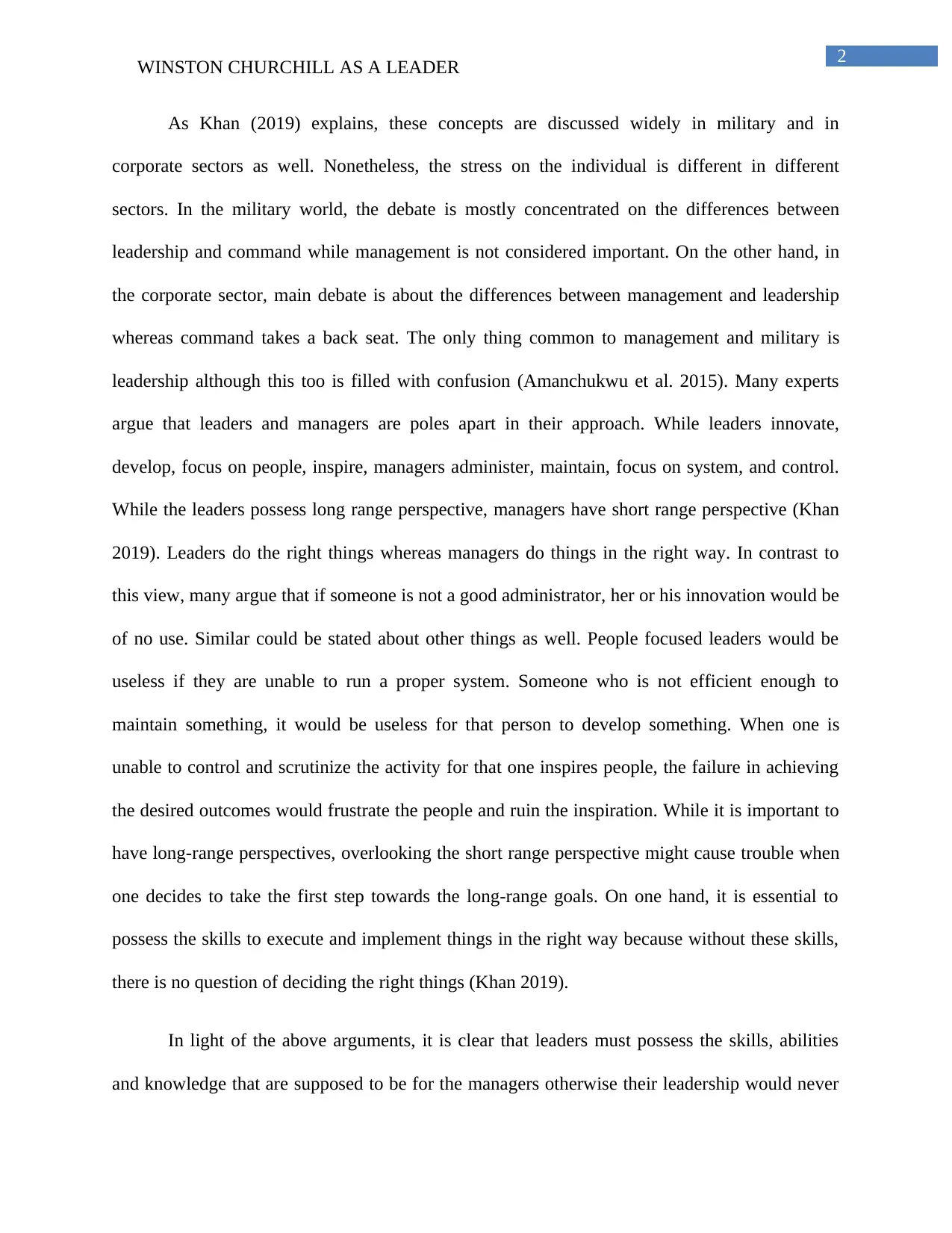
2
WINSTON CHURCHILL AS A LEADER
As Khan (2019) explains, these concepts are discussed widely in military and in
corporate sectors as well. Nonetheless, the stress on the individual is different in different
sectors. In the military world, the debate is mostly concentrated on the differences between
leadership and command while management is not considered important. On the other hand, in
the corporate sector, main debate is about the differences between management and leadership
whereas command takes a back seat. The only thing common to management and military is
leadership although this too is filled with confusion (Amanchukwu et al. 2015). Many experts
argue that leaders and managers are poles apart in their approach. While leaders innovate,
develop, focus on people, inspire, managers administer, maintain, focus on system, and control.
While the leaders possess long range perspective, managers have short range perspective (Khan
2019). Leaders do the right things whereas managers do things in the right way. In contrast to
this view, many argue that if someone is not a good administrator, her or his innovation would be
of no use. Similar could be stated about other things as well. People focused leaders would be
useless if they are unable to run a proper system. Someone who is not efficient enough to
maintain something, it would be useless for that person to develop something. When one is
unable to control and scrutinize the activity for that one inspires people, the failure in achieving
the desired outcomes would frustrate the people and ruin the inspiration. While it is important to
have long-range perspectives, overlooking the short range perspective might cause trouble when
one decides to take the first step towards the long-range goals. On one hand, it is essential to
possess the skills to execute and implement things in the right way because without these skills,
there is no question of deciding the right things (Khan 2019).
In light of the above arguments, it is clear that leaders must possess the skills, abilities
and knowledge that are supposed to be for the managers otherwise their leadership would never
WINSTON CHURCHILL AS A LEADER
As Khan (2019) explains, these concepts are discussed widely in military and in
corporate sectors as well. Nonetheless, the stress on the individual is different in different
sectors. In the military world, the debate is mostly concentrated on the differences between
leadership and command while management is not considered important. On the other hand, in
the corporate sector, main debate is about the differences between management and leadership
whereas command takes a back seat. The only thing common to management and military is
leadership although this too is filled with confusion (Amanchukwu et al. 2015). Many experts
argue that leaders and managers are poles apart in their approach. While leaders innovate,
develop, focus on people, inspire, managers administer, maintain, focus on system, and control.
While the leaders possess long range perspective, managers have short range perspective (Khan
2019). Leaders do the right things whereas managers do things in the right way. In contrast to
this view, many argue that if someone is not a good administrator, her or his innovation would be
of no use. Similar could be stated about other things as well. People focused leaders would be
useless if they are unable to run a proper system. Someone who is not efficient enough to
maintain something, it would be useless for that person to develop something. When one is
unable to control and scrutinize the activity for that one inspires people, the failure in achieving
the desired outcomes would frustrate the people and ruin the inspiration. While it is important to
have long-range perspectives, overlooking the short range perspective might cause trouble when
one decides to take the first step towards the long-range goals. On one hand, it is essential to
possess the skills to execute and implement things in the right way because without these skills,
there is no question of deciding the right things (Khan 2019).
In light of the above arguments, it is clear that leaders must possess the skills, abilities
and knowledge that are supposed to be for the managers otherwise their leadership would never
⊘ This is a preview!⊘
Do you want full access?
Subscribe today to unlock all pages.

Trusted by 1+ million students worldwide
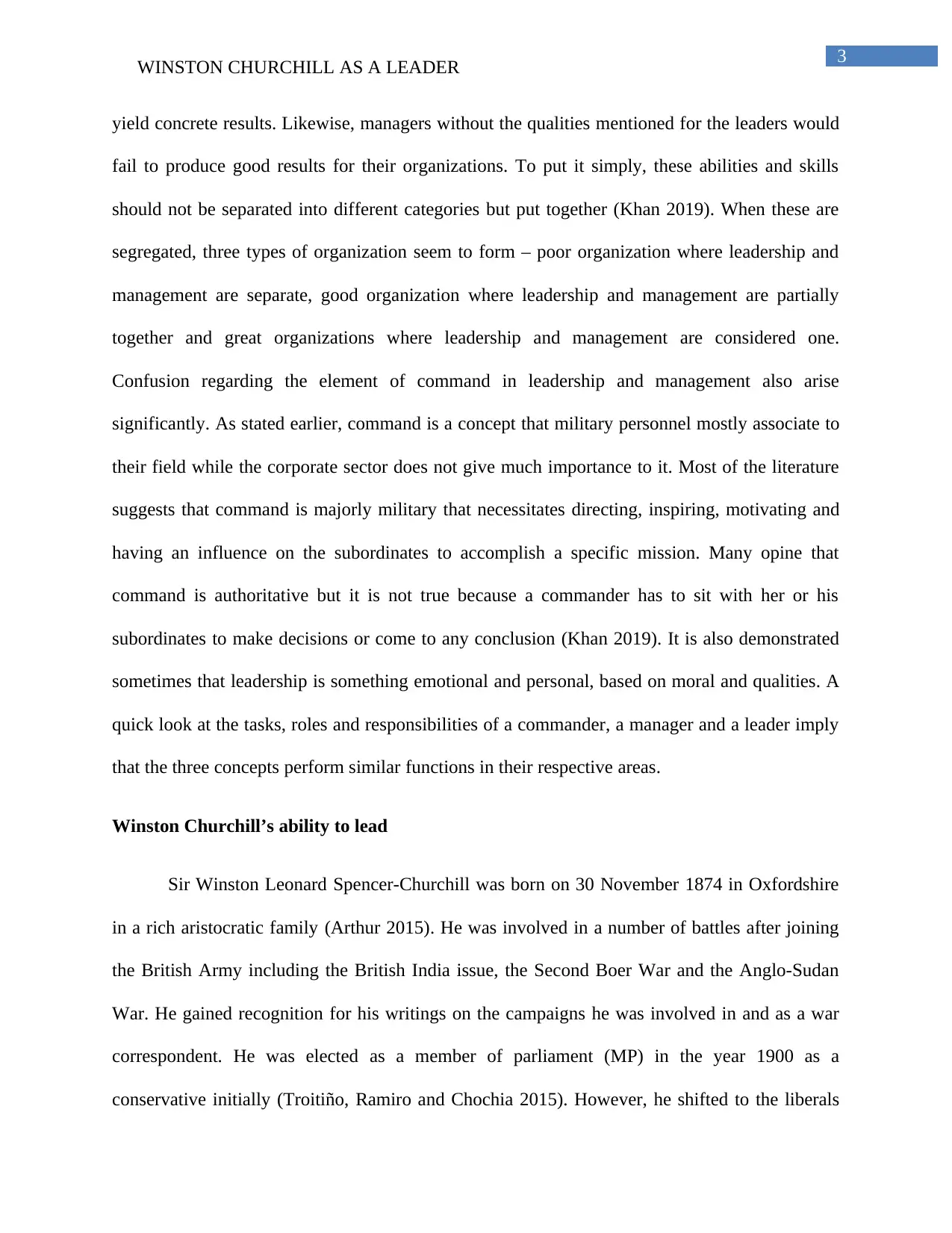
3
WINSTON CHURCHILL AS A LEADER
yield concrete results. Likewise, managers without the qualities mentioned for the leaders would
fail to produce good results for their organizations. To put it simply, these abilities and skills
should not be separated into different categories but put together (Khan 2019). When these are
segregated, three types of organization seem to form – poor organization where leadership and
management are separate, good organization where leadership and management are partially
together and great organizations where leadership and management are considered one.
Confusion regarding the element of command in leadership and management also arise
significantly. As stated earlier, command is a concept that military personnel mostly associate to
their field while the corporate sector does not give much importance to it. Most of the literature
suggests that command is majorly military that necessitates directing, inspiring, motivating and
having an influence on the subordinates to accomplish a specific mission. Many opine that
command is authoritative but it is not true because a commander has to sit with her or his
subordinates to make decisions or come to any conclusion (Khan 2019). It is also demonstrated
sometimes that leadership is something emotional and personal, based on moral and qualities. A
quick look at the tasks, roles and responsibilities of a commander, a manager and a leader imply
that the three concepts perform similar functions in their respective areas.
Winston Churchill’s ability to lead
Sir Winston Leonard Spencer-Churchill was born on 30 November 1874 in Oxfordshire
in a rich aristocratic family (Arthur 2015). He was involved in a number of battles after joining
the British Army including the British India issue, the Second Boer War and the Anglo-Sudan
War. He gained recognition for his writings on the campaigns he was involved in and as a war
correspondent. He was elected as a member of parliament (MP) in the year 1900 as a
conservative initially (Troitiño, Ramiro and Chochia 2015). However, he shifted to the liberals
WINSTON CHURCHILL AS A LEADER
yield concrete results. Likewise, managers without the qualities mentioned for the leaders would
fail to produce good results for their organizations. To put it simply, these abilities and skills
should not be separated into different categories but put together (Khan 2019). When these are
segregated, three types of organization seem to form – poor organization where leadership and
management are separate, good organization where leadership and management are partially
together and great organizations where leadership and management are considered one.
Confusion regarding the element of command in leadership and management also arise
significantly. As stated earlier, command is a concept that military personnel mostly associate to
their field while the corporate sector does not give much importance to it. Most of the literature
suggests that command is majorly military that necessitates directing, inspiring, motivating and
having an influence on the subordinates to accomplish a specific mission. Many opine that
command is authoritative but it is not true because a commander has to sit with her or his
subordinates to make decisions or come to any conclusion (Khan 2019). It is also demonstrated
sometimes that leadership is something emotional and personal, based on moral and qualities. A
quick look at the tasks, roles and responsibilities of a commander, a manager and a leader imply
that the three concepts perform similar functions in their respective areas.
Winston Churchill’s ability to lead
Sir Winston Leonard Spencer-Churchill was born on 30 November 1874 in Oxfordshire
in a rich aristocratic family (Arthur 2015). He was involved in a number of battles after joining
the British Army including the British India issue, the Second Boer War and the Anglo-Sudan
War. He gained recognition for his writings on the campaigns he was involved in and as a war
correspondent. He was elected as a member of parliament (MP) in the year 1900 as a
conservative initially (Troitiño, Ramiro and Chochia 2015). However, he shifted to the liberals
Paraphrase This Document
Need a fresh take? Get an instant paraphrase of this document with our AI Paraphraser
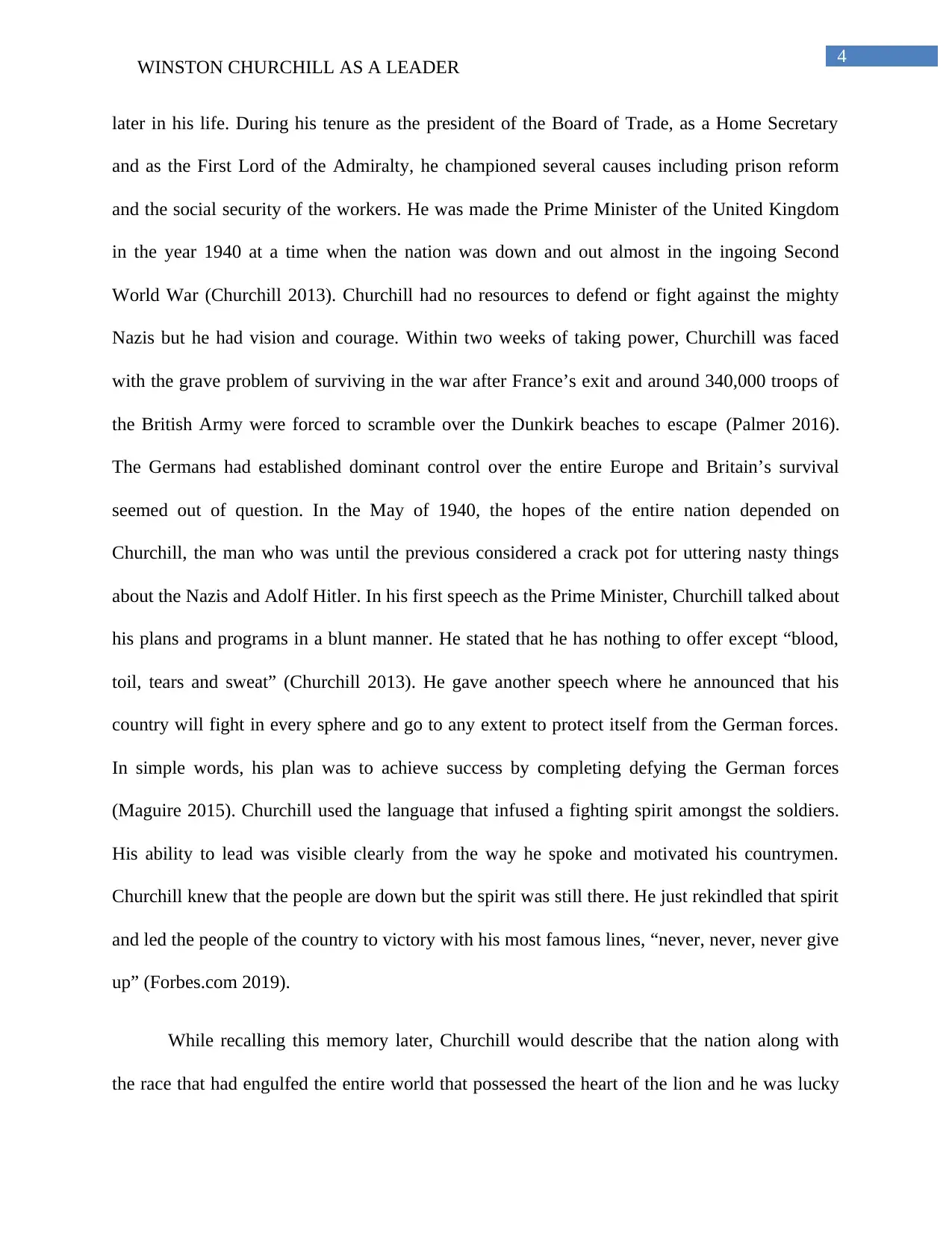
4
WINSTON CHURCHILL AS A LEADER
later in his life. During his tenure as the president of the Board of Trade, as a Home Secretary
and as the First Lord of the Admiralty, he championed several causes including prison reform
and the social security of the workers. He was made the Prime Minister of the United Kingdom
in the year 1940 at a time when the nation was down and out almost in the ingoing Second
World War (Churchill 2013). Churchill had no resources to defend or fight against the mighty
Nazis but he had vision and courage. Within two weeks of taking power, Churchill was faced
with the grave problem of surviving in the war after France’s exit and around 340,000 troops of
the British Army were forced to scramble over the Dunkirk beaches to escape (Palmer 2016).
The Germans had established dominant control over the entire Europe and Britain’s survival
seemed out of question. In the May of 1940, the hopes of the entire nation depended on
Churchill, the man who was until the previous considered a crack pot for uttering nasty things
about the Nazis and Adolf Hitler. In his first speech as the Prime Minister, Churchill talked about
his plans and programs in a blunt manner. He stated that he has nothing to offer except “blood,
toil, tears and sweat” (Churchill 2013). He gave another speech where he announced that his
country will fight in every sphere and go to any extent to protect itself from the German forces.
In simple words, his plan was to achieve success by completing defying the German forces
(Maguire 2015). Churchill used the language that infused a fighting spirit amongst the soldiers.
His ability to lead was visible clearly from the way he spoke and motivated his countrymen.
Churchill knew that the people are down but the spirit was still there. He just rekindled that spirit
and led the people of the country to victory with his most famous lines, “never, never, never give
up” (Forbes.com 2019).
While recalling this memory later, Churchill would describe that the nation along with
the race that had engulfed the entire world that possessed the heart of the lion and he was lucky
WINSTON CHURCHILL AS A LEADER
later in his life. During his tenure as the president of the Board of Trade, as a Home Secretary
and as the First Lord of the Admiralty, he championed several causes including prison reform
and the social security of the workers. He was made the Prime Minister of the United Kingdom
in the year 1940 at a time when the nation was down and out almost in the ingoing Second
World War (Churchill 2013). Churchill had no resources to defend or fight against the mighty
Nazis but he had vision and courage. Within two weeks of taking power, Churchill was faced
with the grave problem of surviving in the war after France’s exit and around 340,000 troops of
the British Army were forced to scramble over the Dunkirk beaches to escape (Palmer 2016).
The Germans had established dominant control over the entire Europe and Britain’s survival
seemed out of question. In the May of 1940, the hopes of the entire nation depended on
Churchill, the man who was until the previous considered a crack pot for uttering nasty things
about the Nazis and Adolf Hitler. In his first speech as the Prime Minister, Churchill talked about
his plans and programs in a blunt manner. He stated that he has nothing to offer except “blood,
toil, tears and sweat” (Churchill 2013). He gave another speech where he announced that his
country will fight in every sphere and go to any extent to protect itself from the German forces.
In simple words, his plan was to achieve success by completing defying the German forces
(Maguire 2015). Churchill used the language that infused a fighting spirit amongst the soldiers.
His ability to lead was visible clearly from the way he spoke and motivated his countrymen.
Churchill knew that the people are down but the spirit was still there. He just rekindled that spirit
and led the people of the country to victory with his most famous lines, “never, never, never give
up” (Forbes.com 2019).
While recalling this memory later, Churchill would describe that the nation along with
the race that had engulfed the entire world that possessed the heart of the lion and he was lucky
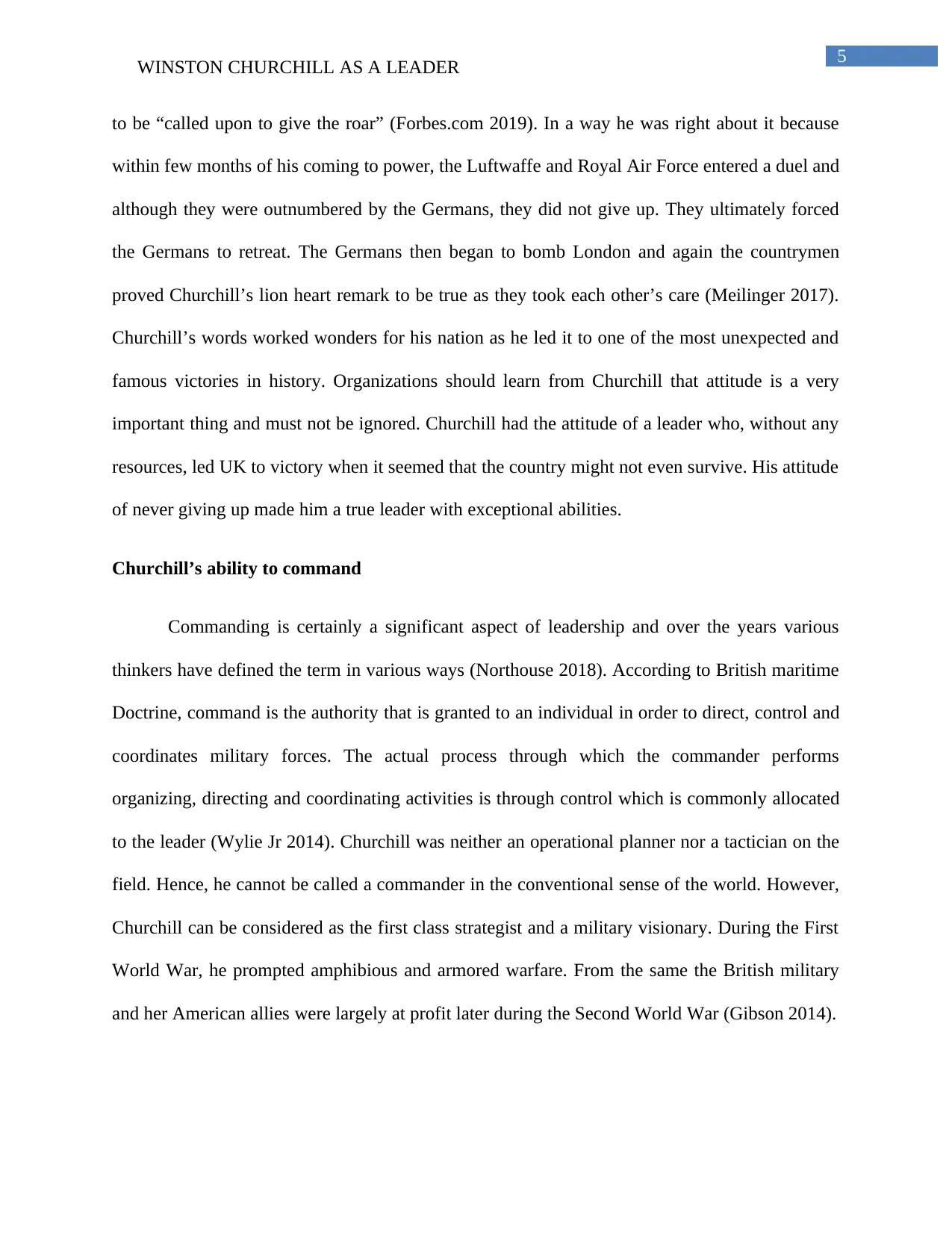
5
WINSTON CHURCHILL AS A LEADER
to be “called upon to give the roar” (Forbes.com 2019). In a way he was right about it because
within few months of his coming to power, the Luftwaffe and Royal Air Force entered a duel and
although they were outnumbered by the Germans, they did not give up. They ultimately forced
the Germans to retreat. The Germans then began to bomb London and again the countrymen
proved Churchill’s lion heart remark to be true as they took each other’s care (Meilinger 2017).
Churchill’s words worked wonders for his nation as he led it to one of the most unexpected and
famous victories in history. Organizations should learn from Churchill that attitude is a very
important thing and must not be ignored. Churchill had the attitude of a leader who, without any
resources, led UK to victory when it seemed that the country might not even survive. His attitude
of never giving up made him a true leader with exceptional abilities.
Churchill’s ability to command
Commanding is certainly a significant aspect of leadership and over the years various
thinkers have defined the term in various ways (Northouse 2018). According to British maritime
Doctrine, command is the authority that is granted to an individual in order to direct, control and
coordinates military forces. The actual process through which the commander performs
organizing, directing and coordinating activities is through control which is commonly allocated
to the leader (Wylie Jr 2014). Churchill was neither an operational planner nor a tactician on the
field. Hence, he cannot be called a commander in the conventional sense of the world. However,
Churchill can be considered as the first class strategist and a military visionary. During the First
World War, he prompted amphibious and armored warfare. From the same the British military
and her American allies were largely at profit later during the Second World War (Gibson 2014).
WINSTON CHURCHILL AS A LEADER
to be “called upon to give the roar” (Forbes.com 2019). In a way he was right about it because
within few months of his coming to power, the Luftwaffe and Royal Air Force entered a duel and
although they were outnumbered by the Germans, they did not give up. They ultimately forced
the Germans to retreat. The Germans then began to bomb London and again the countrymen
proved Churchill’s lion heart remark to be true as they took each other’s care (Meilinger 2017).
Churchill’s words worked wonders for his nation as he led it to one of the most unexpected and
famous victories in history. Organizations should learn from Churchill that attitude is a very
important thing and must not be ignored. Churchill had the attitude of a leader who, without any
resources, led UK to victory when it seemed that the country might not even survive. His attitude
of never giving up made him a true leader with exceptional abilities.
Churchill’s ability to command
Commanding is certainly a significant aspect of leadership and over the years various
thinkers have defined the term in various ways (Northouse 2018). According to British maritime
Doctrine, command is the authority that is granted to an individual in order to direct, control and
coordinates military forces. The actual process through which the commander performs
organizing, directing and coordinating activities is through control which is commonly allocated
to the leader (Wylie Jr 2014). Churchill was neither an operational planner nor a tactician on the
field. Hence, he cannot be called a commander in the conventional sense of the world. However,
Churchill can be considered as the first class strategist and a military visionary. During the First
World War, he prompted amphibious and armored warfare. From the same the British military
and her American allies were largely at profit later during the Second World War (Gibson 2014).
⊘ This is a preview!⊘
Do you want full access?
Subscribe today to unlock all pages.

Trusted by 1+ million students worldwide
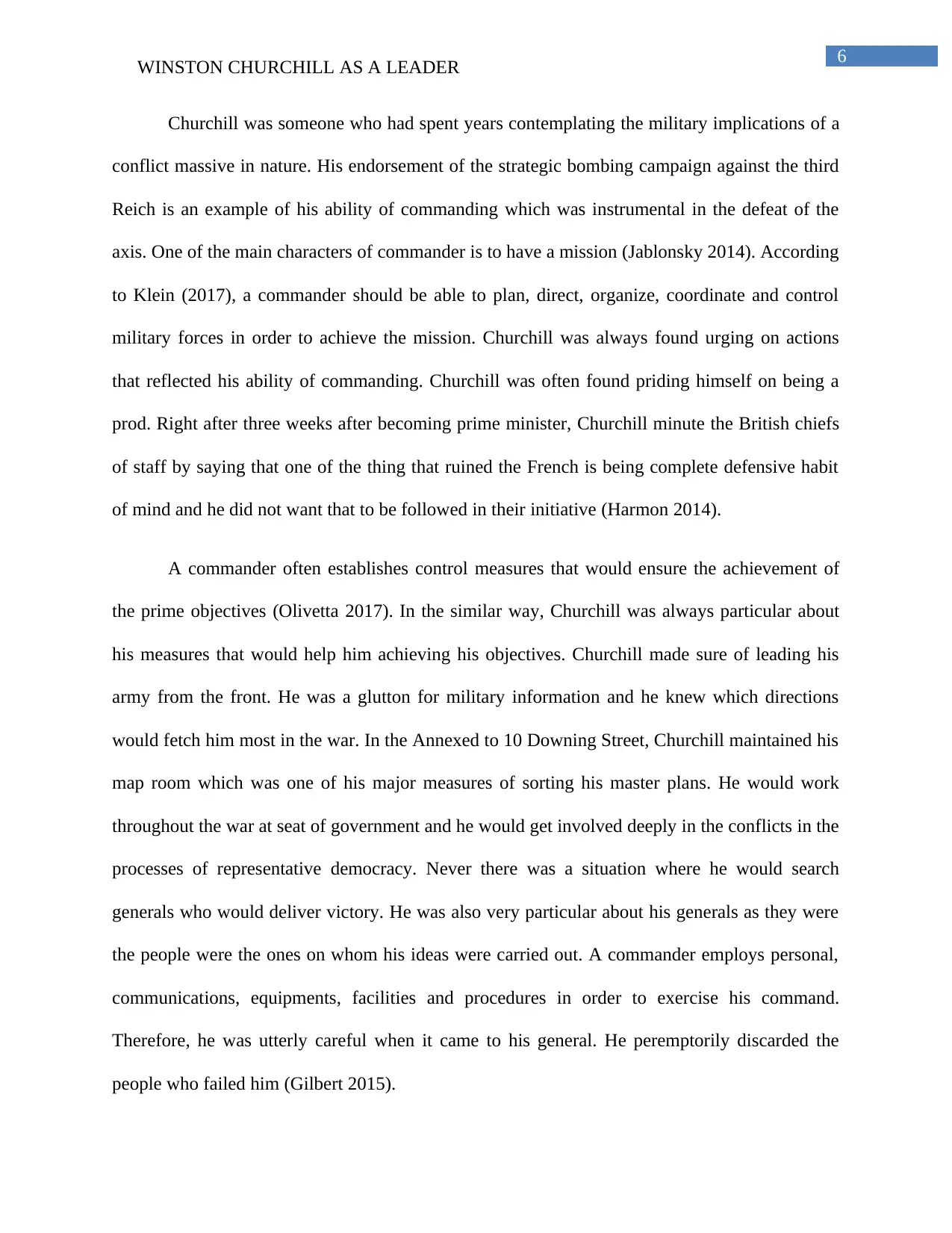
6
WINSTON CHURCHILL AS A LEADER
Churchill was someone who had spent years contemplating the military implications of a
conflict massive in nature. His endorsement of the strategic bombing campaign against the third
Reich is an example of his ability of commanding which was instrumental in the defeat of the
axis. One of the main characters of commander is to have a mission (Jablonsky 2014). According
to Klein (2017), a commander should be able to plan, direct, organize, coordinate and control
military forces in order to achieve the mission. Churchill was always found urging on actions
that reflected his ability of commanding. Churchill was often found priding himself on being a
prod. Right after three weeks after becoming prime minister, Churchill minute the British chiefs
of staff by saying that one of the thing that ruined the French is being complete defensive habit
of mind and he did not want that to be followed in their initiative (Harmon 2014).
A commander often establishes control measures that would ensure the achievement of
the prime objectives (Olivetta 2017). In the similar way, Churchill was always particular about
his measures that would help him achieving his objectives. Churchill made sure of leading his
army from the front. He was a glutton for military information and he knew which directions
would fetch him most in the war. In the Annexed to 10 Downing Street, Churchill maintained his
map room which was one of his major measures of sorting his master plans. He would work
throughout the war at seat of government and he would get involved deeply in the conflicts in the
processes of representative democracy. Never there was a situation where he would search
generals who would deliver victory. He was also very particular about his generals as they were
the people were the ones on whom his ideas were carried out. A commander employs personal,
communications, equipments, facilities and procedures in order to exercise his command.
Therefore, he was utterly careful when it came to his general. He peremptorily discarded the
people who failed him (Gilbert 2015).
WINSTON CHURCHILL AS A LEADER
Churchill was someone who had spent years contemplating the military implications of a
conflict massive in nature. His endorsement of the strategic bombing campaign against the third
Reich is an example of his ability of commanding which was instrumental in the defeat of the
axis. One of the main characters of commander is to have a mission (Jablonsky 2014). According
to Klein (2017), a commander should be able to plan, direct, organize, coordinate and control
military forces in order to achieve the mission. Churchill was always found urging on actions
that reflected his ability of commanding. Churchill was often found priding himself on being a
prod. Right after three weeks after becoming prime minister, Churchill minute the British chiefs
of staff by saying that one of the thing that ruined the French is being complete defensive habit
of mind and he did not want that to be followed in their initiative (Harmon 2014).
A commander often establishes control measures that would ensure the achievement of
the prime objectives (Olivetta 2017). In the similar way, Churchill was always particular about
his measures that would help him achieving his objectives. Churchill made sure of leading his
army from the front. He was a glutton for military information and he knew which directions
would fetch him most in the war. In the Annexed to 10 Downing Street, Churchill maintained his
map room which was one of his major measures of sorting his master plans. He would work
throughout the war at seat of government and he would get involved deeply in the conflicts in the
processes of representative democracy. Never there was a situation where he would search
generals who would deliver victory. He was also very particular about his generals as they were
the people were the ones on whom his ideas were carried out. A commander employs personal,
communications, equipments, facilities and procedures in order to exercise his command.
Therefore, he was utterly careful when it came to his general. He peremptorily discarded the
people who failed him (Gilbert 2015).
Paraphrase This Document
Need a fresh take? Get an instant paraphrase of this document with our AI Paraphraser
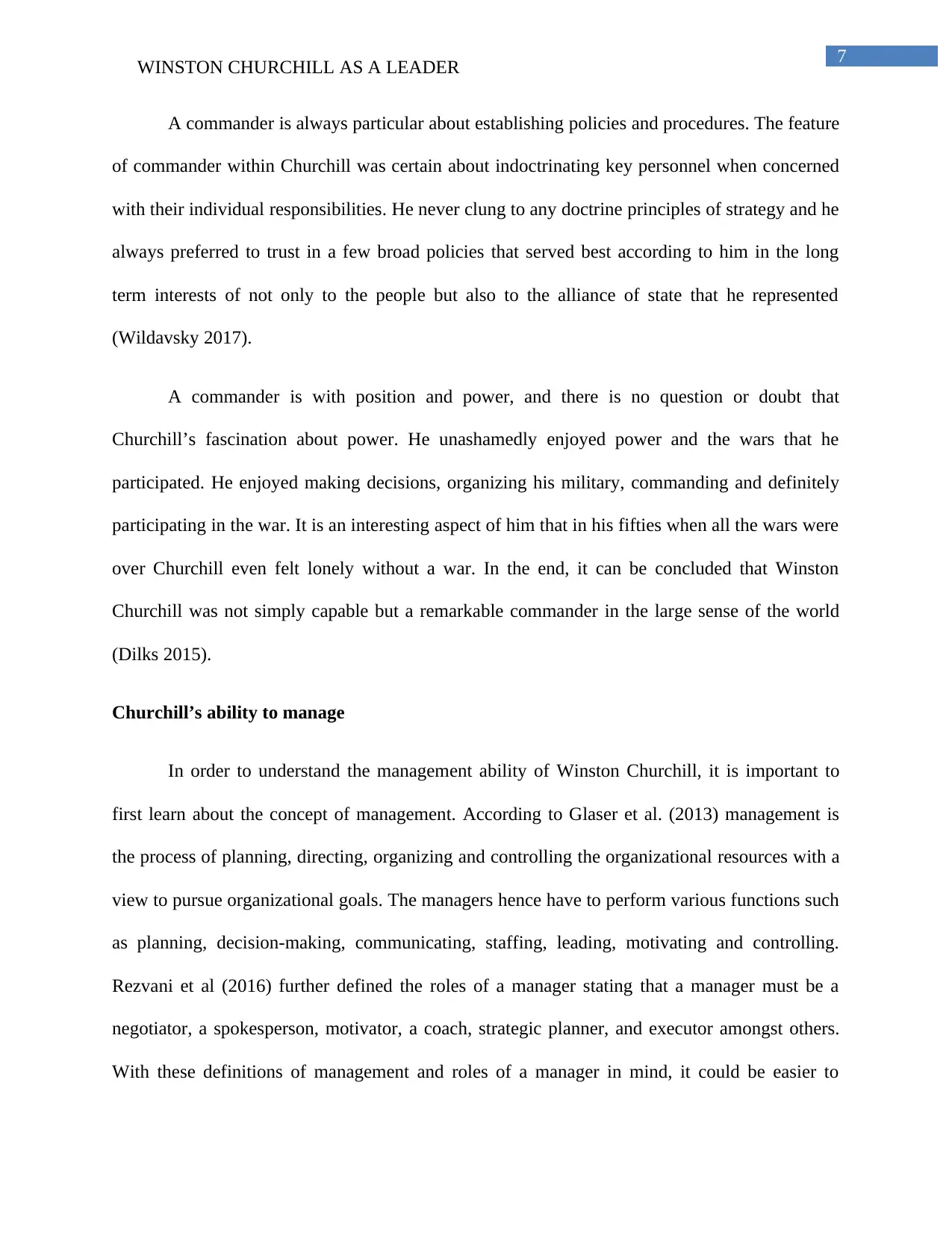
7
WINSTON CHURCHILL AS A LEADER
A commander is always particular about establishing policies and procedures. The feature
of commander within Churchill was certain about indoctrinating key personnel when concerned
with their individual responsibilities. He never clung to any doctrine principles of strategy and he
always preferred to trust in a few broad policies that served best according to him in the long
term interests of not only to the people but also to the alliance of state that he represented
(Wildavsky 2017).
A commander is with position and power, and there is no question or doubt that
Churchill’s fascination about power. He unashamedly enjoyed power and the wars that he
participated. He enjoyed making decisions, organizing his military, commanding and definitely
participating in the war. It is an interesting aspect of him that in his fifties when all the wars were
over Churchill even felt lonely without a war. In the end, it can be concluded that Winston
Churchill was not simply capable but a remarkable commander in the large sense of the world
(Dilks 2015).
Churchill’s ability to manage
In order to understand the management ability of Winston Churchill, it is important to
first learn about the concept of management. According to Glaser et al. (2013) management is
the process of planning, directing, organizing and controlling the organizational resources with a
view to pursue organizational goals. The managers hence have to perform various functions such
as planning, decision-making, communicating, staffing, leading, motivating and controlling.
Rezvani et al (2016) further defined the roles of a manager stating that a manager must be a
negotiator, a spokesperson, motivator, a coach, strategic planner, and executor amongst others.
With these definitions of management and roles of a manager in mind, it could be easier to
WINSTON CHURCHILL AS A LEADER
A commander is always particular about establishing policies and procedures. The feature
of commander within Churchill was certain about indoctrinating key personnel when concerned
with their individual responsibilities. He never clung to any doctrine principles of strategy and he
always preferred to trust in a few broad policies that served best according to him in the long
term interests of not only to the people but also to the alliance of state that he represented
(Wildavsky 2017).
A commander is with position and power, and there is no question or doubt that
Churchill’s fascination about power. He unashamedly enjoyed power and the wars that he
participated. He enjoyed making decisions, organizing his military, commanding and definitely
participating in the war. It is an interesting aspect of him that in his fifties when all the wars were
over Churchill even felt lonely without a war. In the end, it can be concluded that Winston
Churchill was not simply capable but a remarkable commander in the large sense of the world
(Dilks 2015).
Churchill’s ability to manage
In order to understand the management ability of Winston Churchill, it is important to
first learn about the concept of management. According to Glaser et al. (2013) management is
the process of planning, directing, organizing and controlling the organizational resources with a
view to pursue organizational goals. The managers hence have to perform various functions such
as planning, decision-making, communicating, staffing, leading, motivating and controlling.
Rezvani et al (2016) further defined the roles of a manager stating that a manager must be a
negotiator, a spokesperson, motivator, a coach, strategic planner, and executor amongst others.
With these definitions of management and roles of a manager in mind, it could be easier to
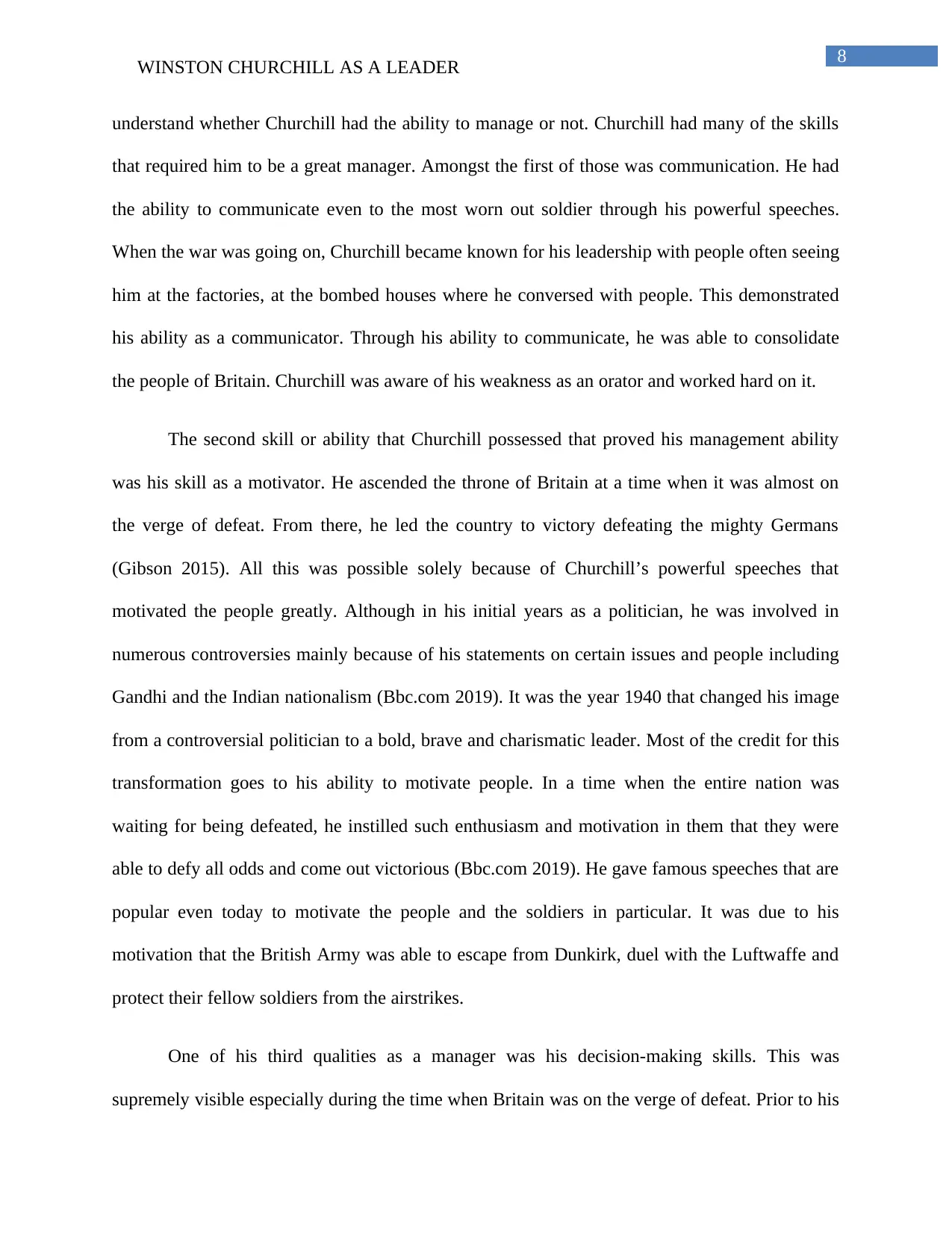
8
WINSTON CHURCHILL AS A LEADER
understand whether Churchill had the ability to manage or not. Churchill had many of the skills
that required him to be a great manager. Amongst the first of those was communication. He had
the ability to communicate even to the most worn out soldier through his powerful speeches.
When the war was going on, Churchill became known for his leadership with people often seeing
him at the factories, at the bombed houses where he conversed with people. This demonstrated
his ability as a communicator. Through his ability to communicate, he was able to consolidate
the people of Britain. Churchill was aware of his weakness as an orator and worked hard on it.
The second skill or ability that Churchill possessed that proved his management ability
was his skill as a motivator. He ascended the throne of Britain at a time when it was almost on
the verge of defeat. From there, he led the country to victory defeating the mighty Germans
(Gibson 2015). All this was possible solely because of Churchill’s powerful speeches that
motivated the people greatly. Although in his initial years as a politician, he was involved in
numerous controversies mainly because of his statements on certain issues and people including
Gandhi and the Indian nationalism (Bbc.com 2019). It was the year 1940 that changed his image
from a controversial politician to a bold, brave and charismatic leader. Most of the credit for this
transformation goes to his ability to motivate people. In a time when the entire nation was
waiting for being defeated, he instilled such enthusiasm and motivation in them that they were
able to defy all odds and come out victorious (Bbc.com 2019). He gave famous speeches that are
popular even today to motivate the people and the soldiers in particular. It was due to his
motivation that the British Army was able to escape from Dunkirk, duel with the Luftwaffe and
protect their fellow soldiers from the airstrikes.
One of his third qualities as a manager was his decision-making skills. This was
supremely visible especially during the time when Britain was on the verge of defeat. Prior to his
WINSTON CHURCHILL AS A LEADER
understand whether Churchill had the ability to manage or not. Churchill had many of the skills
that required him to be a great manager. Amongst the first of those was communication. He had
the ability to communicate even to the most worn out soldier through his powerful speeches.
When the war was going on, Churchill became known for his leadership with people often seeing
him at the factories, at the bombed houses where he conversed with people. This demonstrated
his ability as a communicator. Through his ability to communicate, he was able to consolidate
the people of Britain. Churchill was aware of his weakness as an orator and worked hard on it.
The second skill or ability that Churchill possessed that proved his management ability
was his skill as a motivator. He ascended the throne of Britain at a time when it was almost on
the verge of defeat. From there, he led the country to victory defeating the mighty Germans
(Gibson 2015). All this was possible solely because of Churchill’s powerful speeches that
motivated the people greatly. Although in his initial years as a politician, he was involved in
numerous controversies mainly because of his statements on certain issues and people including
Gandhi and the Indian nationalism (Bbc.com 2019). It was the year 1940 that changed his image
from a controversial politician to a bold, brave and charismatic leader. Most of the credit for this
transformation goes to his ability to motivate people. In a time when the entire nation was
waiting for being defeated, he instilled such enthusiasm and motivation in them that they were
able to defy all odds and come out victorious (Bbc.com 2019). He gave famous speeches that are
popular even today to motivate the people and the soldiers in particular. It was due to his
motivation that the British Army was able to escape from Dunkirk, duel with the Luftwaffe and
protect their fellow soldiers from the airstrikes.
One of his third qualities as a manager was his decision-making skills. This was
supremely visible especially during the time when Britain was on the verge of defeat. Prior to his
⊘ This is a preview!⊘
Do you want full access?
Subscribe today to unlock all pages.

Trusted by 1+ million students worldwide
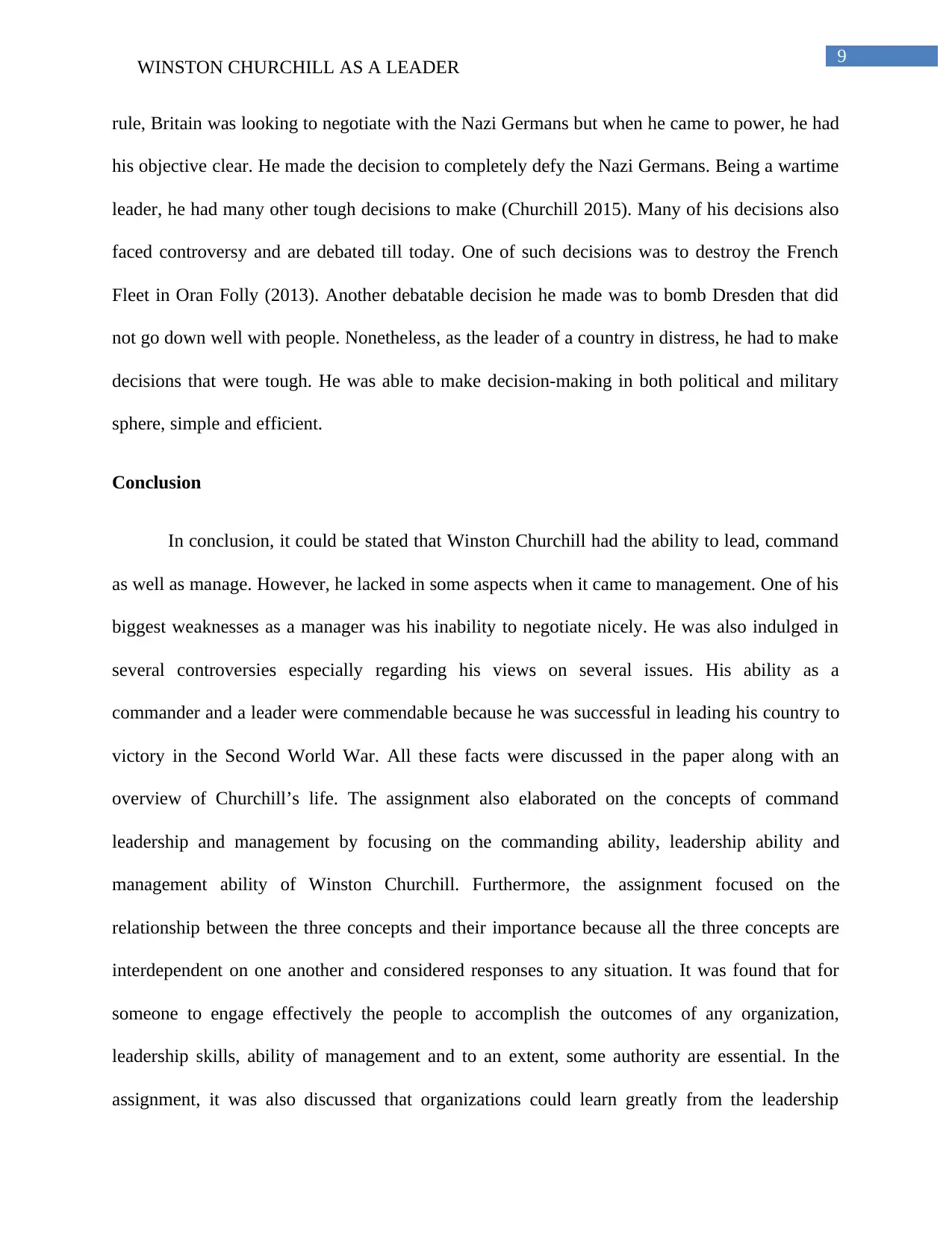
9
WINSTON CHURCHILL AS A LEADER
rule, Britain was looking to negotiate with the Nazi Germans but when he came to power, he had
his objective clear. He made the decision to completely defy the Nazi Germans. Being a wartime
leader, he had many other tough decisions to make (Churchill 2015). Many of his decisions also
faced controversy and are debated till today. One of such decisions was to destroy the French
Fleet in Oran Folly (2013). Another debatable decision he made was to bomb Dresden that did
not go down well with people. Nonetheless, as the leader of a country in distress, he had to make
decisions that were tough. He was able to make decision-making in both political and military
sphere, simple and efficient.
Conclusion
In conclusion, it could be stated that Winston Churchill had the ability to lead, command
as well as manage. However, he lacked in some aspects when it came to management. One of his
biggest weaknesses as a manager was his inability to negotiate nicely. He was also indulged in
several controversies especially regarding his views on several issues. His ability as a
commander and a leader were commendable because he was successful in leading his country to
victory in the Second World War. All these facts were discussed in the paper along with an
overview of Churchill’s life. The assignment also elaborated on the concepts of command
leadership and management by focusing on the commanding ability, leadership ability and
management ability of Winston Churchill. Furthermore, the assignment focused on the
relationship between the three concepts and their importance because all the three concepts are
interdependent on one another and considered responses to any situation. It was found that for
someone to engage effectively the people to accomplish the outcomes of any organization,
leadership skills, ability of management and to an extent, some authority are essential. In the
assignment, it was also discussed that organizations could learn greatly from the leadership
WINSTON CHURCHILL AS A LEADER
rule, Britain was looking to negotiate with the Nazi Germans but when he came to power, he had
his objective clear. He made the decision to completely defy the Nazi Germans. Being a wartime
leader, he had many other tough decisions to make (Churchill 2015). Many of his decisions also
faced controversy and are debated till today. One of such decisions was to destroy the French
Fleet in Oran Folly (2013). Another debatable decision he made was to bomb Dresden that did
not go down well with people. Nonetheless, as the leader of a country in distress, he had to make
decisions that were tough. He was able to make decision-making in both political and military
sphere, simple and efficient.
Conclusion
In conclusion, it could be stated that Winston Churchill had the ability to lead, command
as well as manage. However, he lacked in some aspects when it came to management. One of his
biggest weaknesses as a manager was his inability to negotiate nicely. He was also indulged in
several controversies especially regarding his views on several issues. His ability as a
commander and a leader were commendable because he was successful in leading his country to
victory in the Second World War. All these facts were discussed in the paper along with an
overview of Churchill’s life. The assignment also elaborated on the concepts of command
leadership and management by focusing on the commanding ability, leadership ability and
management ability of Winston Churchill. Furthermore, the assignment focused on the
relationship between the three concepts and their importance because all the three concepts are
interdependent on one another and considered responses to any situation. It was found that for
someone to engage effectively the people to accomplish the outcomes of any organization,
leadership skills, ability of management and to an extent, some authority are essential. In the
assignment, it was also discussed that organizations could learn greatly from the leadership
Paraphrase This Document
Need a fresh take? Get an instant paraphrase of this document with our AI Paraphraser
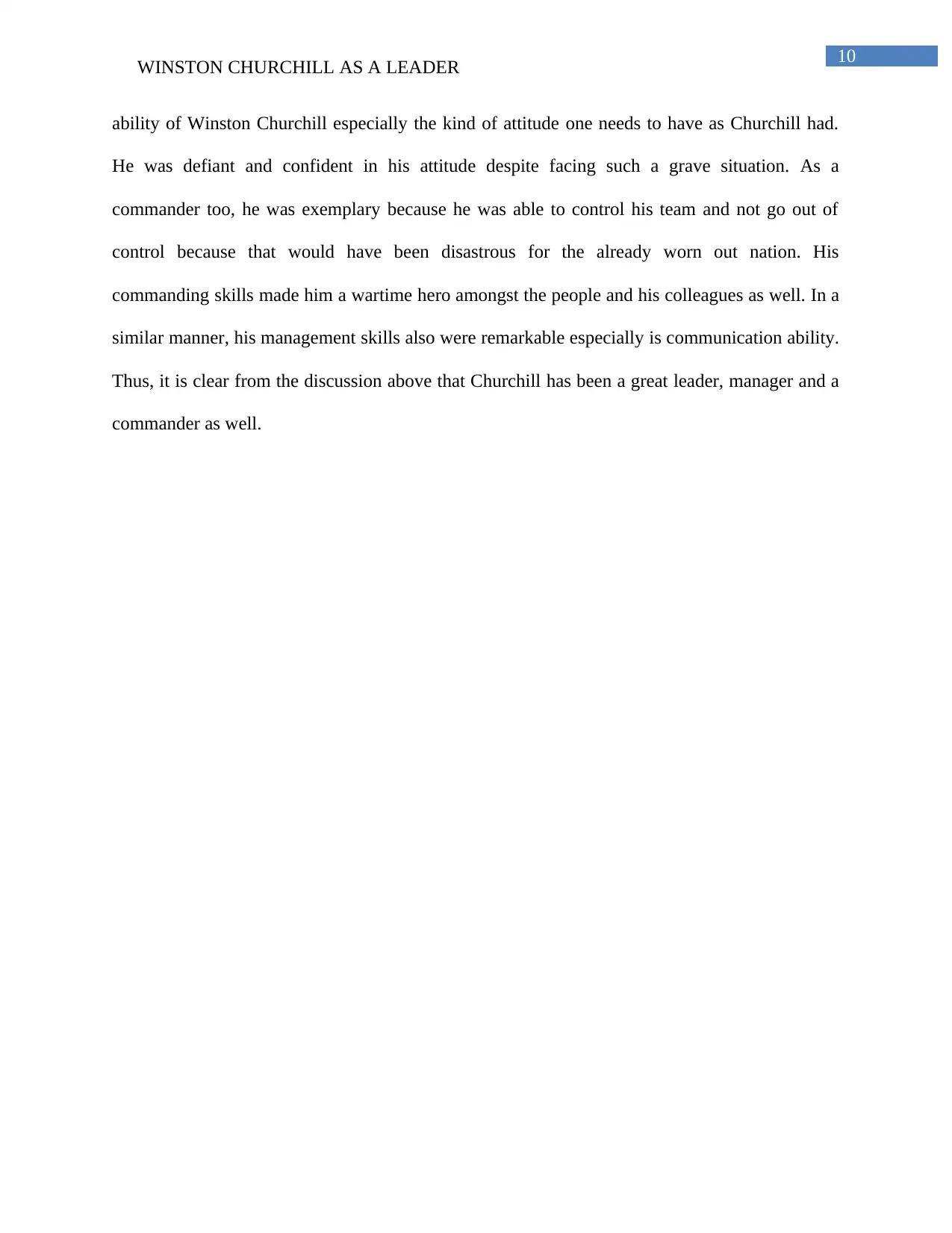
10
WINSTON CHURCHILL AS A LEADER
ability of Winston Churchill especially the kind of attitude one needs to have as Churchill had.
He was defiant and confident in his attitude despite facing such a grave situation. As a
commander too, he was exemplary because he was able to control his team and not go out of
control because that would have been disastrous for the already worn out nation. His
commanding skills made him a wartime hero amongst the people and his colleagues as well. In a
similar manner, his management skills also were remarkable especially is communication ability.
Thus, it is clear from the discussion above that Churchill has been a great leader, manager and a
commander as well.
WINSTON CHURCHILL AS A LEADER
ability of Winston Churchill especially the kind of attitude one needs to have as Churchill had.
He was defiant and confident in his attitude despite facing such a grave situation. As a
commander too, he was exemplary because he was able to control his team and not go out of
control because that would have been disastrous for the already worn out nation. His
commanding skills made him a wartime hero amongst the people and his colleagues as well. In a
similar manner, his management skills also were remarkable especially is communication ability.
Thus, it is clear from the discussion above that Churchill has been a great leader, manager and a
commander as well.
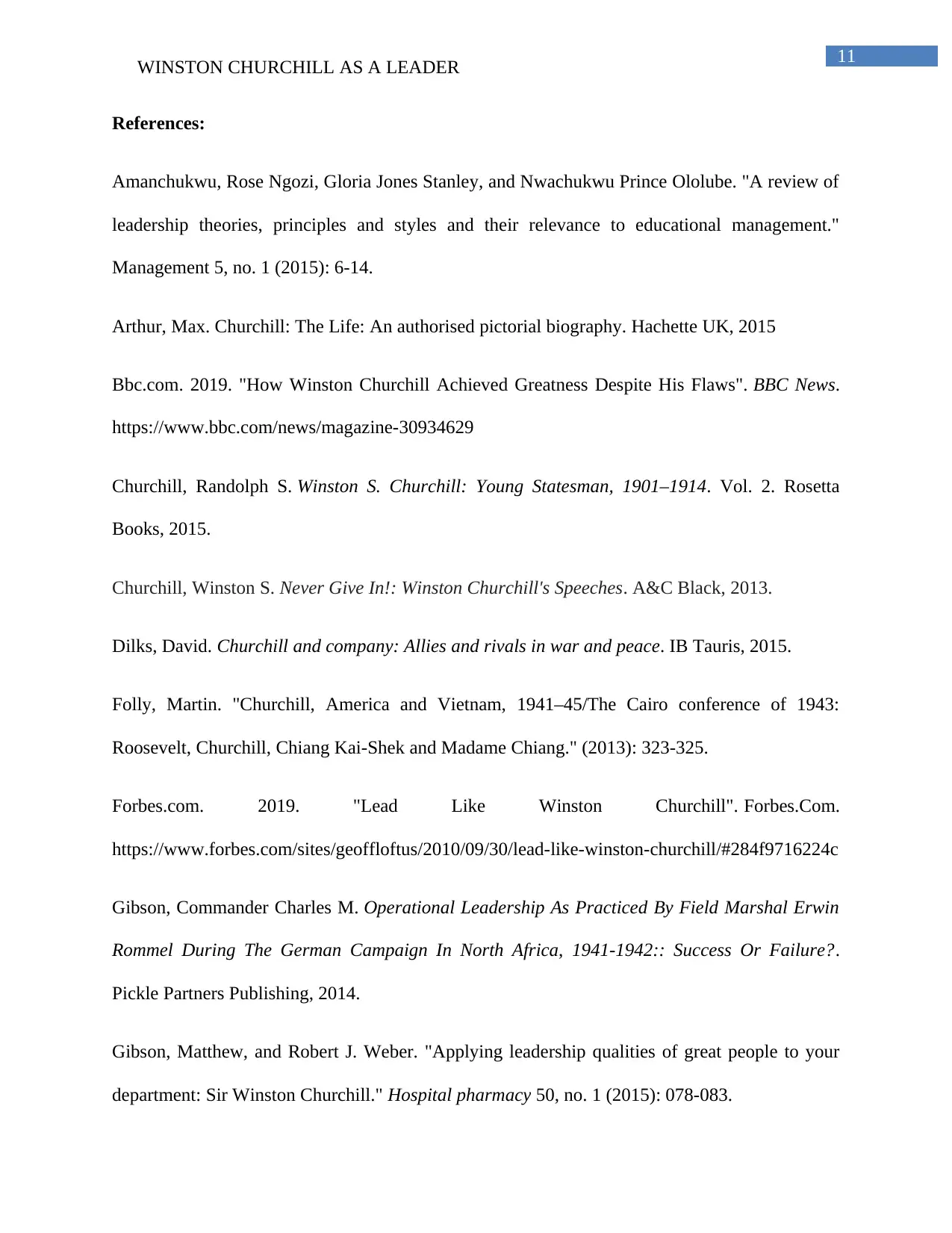
11
WINSTON CHURCHILL AS A LEADER
References:
Amanchukwu, Rose Ngozi, Gloria Jones Stanley, and Nwachukwu Prince Ololube. "A review of
leadership theories, principles and styles and their relevance to educational management."
Management 5, no. 1 (2015): 6-14.
Arthur, Max. Churchill: The Life: An authorised pictorial biography. Hachette UK, 2015
Bbc.com. 2019. "How Winston Churchill Achieved Greatness Despite His Flaws". BBC News.
https://www.bbc.com/news/magazine-30934629
Churchill, Randolph S. Winston S. Churchill: Young Statesman, 1901–1914. Vol. 2. Rosetta
Books, 2015.
Churchill, Winston S. Never Give In!: Winston Churchill's Speeches. A&C Black, 2013.
Dilks, David. Churchill and company: Allies and rivals in war and peace. IB Tauris, 2015.
Folly, Martin. "Churchill, America and Vietnam, 1941–45/The Cairo conference of 1943:
Roosevelt, Churchill, Chiang Kai-Shek and Madame Chiang." (2013): 323-325.
Forbes.com. 2019. "Lead Like Winston Churchill". Forbes.Com.
https://www.forbes.com/sites/geoffloftus/2010/09/30/lead-like-winston-churchill/#284f9716224c
Gibson, Commander Charles M. Operational Leadership As Practiced By Field Marshal Erwin
Rommel During The German Campaign In North Africa, 1941-1942:: Success Or Failure?.
Pickle Partners Publishing, 2014.
Gibson, Matthew, and Robert J. Weber. "Applying leadership qualities of great people to your
department: Sir Winston Churchill." Hospital pharmacy 50, no. 1 (2015): 078-083.
WINSTON CHURCHILL AS A LEADER
References:
Amanchukwu, Rose Ngozi, Gloria Jones Stanley, and Nwachukwu Prince Ololube. "A review of
leadership theories, principles and styles and their relevance to educational management."
Management 5, no. 1 (2015): 6-14.
Arthur, Max. Churchill: The Life: An authorised pictorial biography. Hachette UK, 2015
Bbc.com. 2019. "How Winston Churchill Achieved Greatness Despite His Flaws". BBC News.
https://www.bbc.com/news/magazine-30934629
Churchill, Randolph S. Winston S. Churchill: Young Statesman, 1901–1914. Vol. 2. Rosetta
Books, 2015.
Churchill, Winston S. Never Give In!: Winston Churchill's Speeches. A&C Black, 2013.
Dilks, David. Churchill and company: Allies and rivals in war and peace. IB Tauris, 2015.
Folly, Martin. "Churchill, America and Vietnam, 1941–45/The Cairo conference of 1943:
Roosevelt, Churchill, Chiang Kai-Shek and Madame Chiang." (2013): 323-325.
Forbes.com. 2019. "Lead Like Winston Churchill". Forbes.Com.
https://www.forbes.com/sites/geoffloftus/2010/09/30/lead-like-winston-churchill/#284f9716224c
Gibson, Commander Charles M. Operational Leadership As Practiced By Field Marshal Erwin
Rommel During The German Campaign In North Africa, 1941-1942:: Success Or Failure?.
Pickle Partners Publishing, 2014.
Gibson, Matthew, and Robert J. Weber. "Applying leadership qualities of great people to your
department: Sir Winston Churchill." Hospital pharmacy 50, no. 1 (2015): 078-083.
⊘ This is a preview!⊘
Do you want full access?
Subscribe today to unlock all pages.

Trusted by 1+ million students worldwide
1 out of 14
Related Documents
Your All-in-One AI-Powered Toolkit for Academic Success.
+13062052269
info@desklib.com
Available 24*7 on WhatsApp / Email
![[object Object]](/_next/static/media/star-bottom.7253800d.svg)
Unlock your academic potential
Copyright © 2020–2026 A2Z Services. All Rights Reserved. Developed and managed by ZUCOL.





